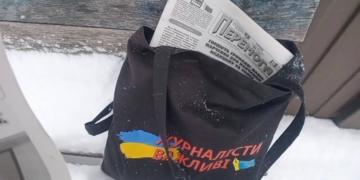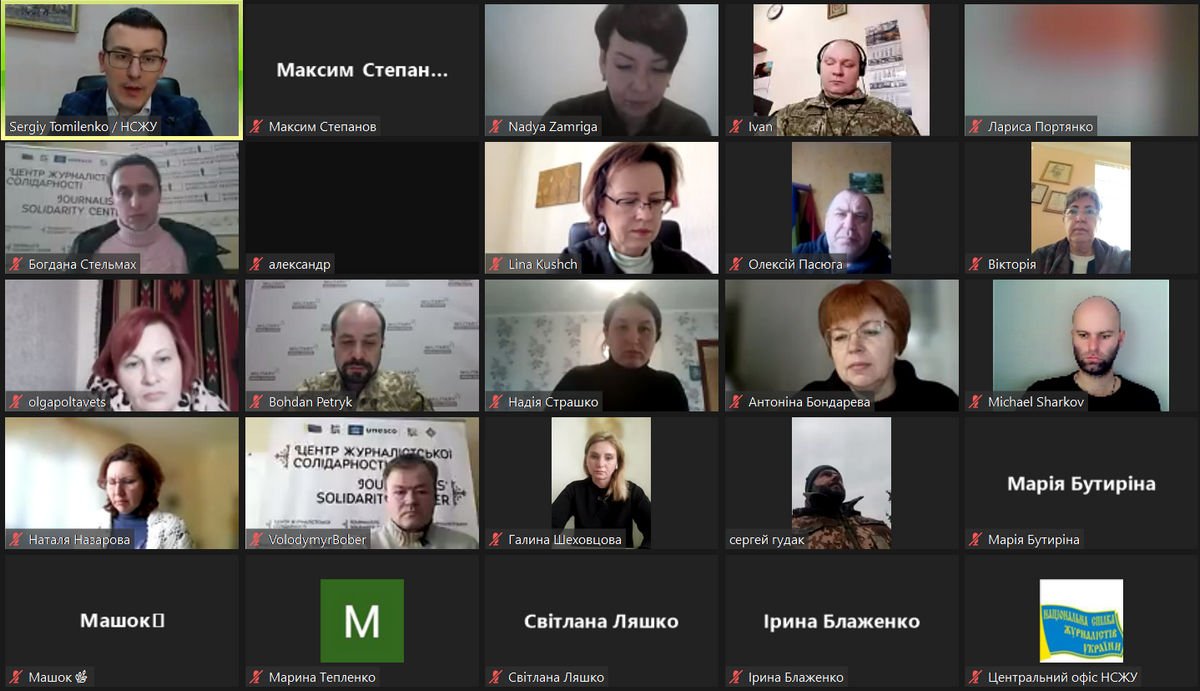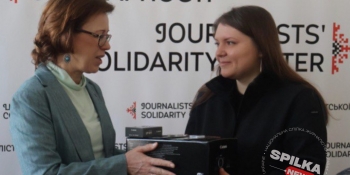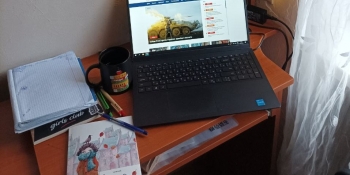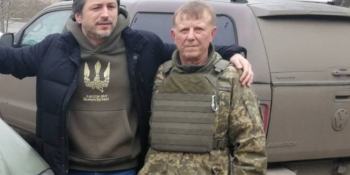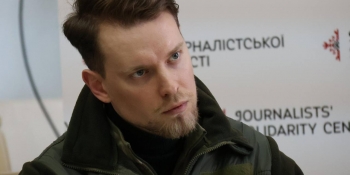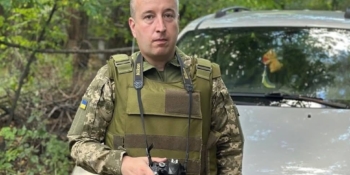Military press officers told about how civilian journalists should behave during trips to the front line and how to prepare high-quality, quick material, while not creating troubles for the Armed Forces of Ukraine (AFU). It happened at an online meeting called Work of Press Officers and Cooperation with Civilian Journalists hosted by the network of the Journalists’ Solidarity Centers of the National Union of Journalists of Ukraine (NUJU) on February 16, the day of the professional holiday of military journalists.
Have congratulated uniformed media workers, President of the NUJU Sergiy Tomilenko noted that the Union always supports military journalists – both when they perform their official duties and when, unfortunately, they find themselves in trouble.
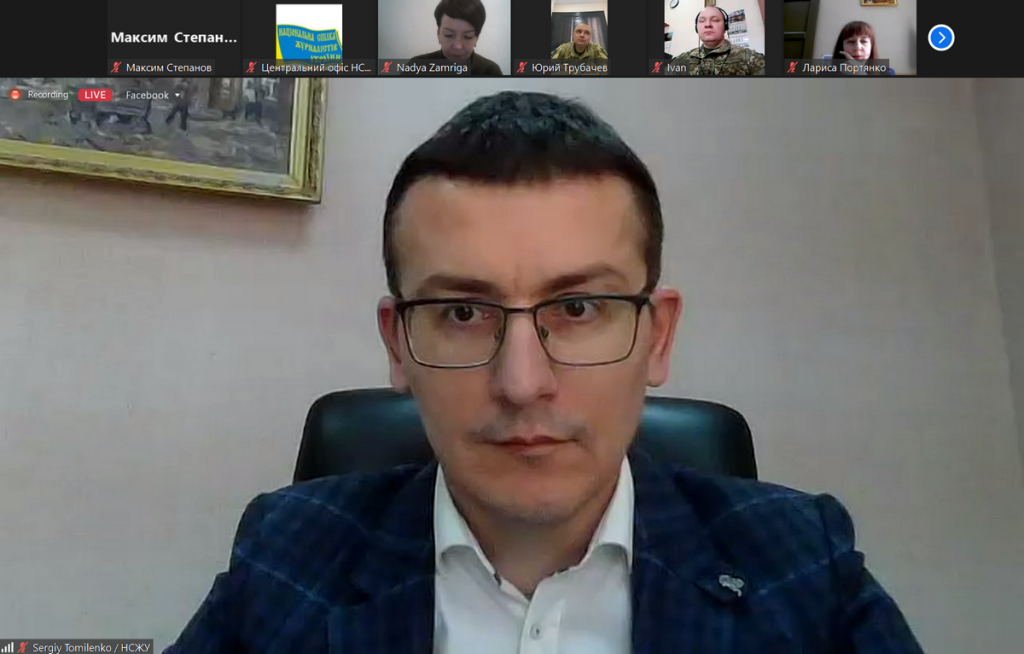
“We are a single family of journalists, we are all united to repel the invaders and bring the victory for Ukraine,” Sergiy Tomilenko emphasized.
He reminded that the safety of journalists is “among the absolute priorities of the NUJU, therefore the Union systematically conducts safety trainings, and through a network of rental points, provides free of charge protective kits (body armor, a helmet, a tactical first aid kit) to journalists traveling to hot spots, obtained with the assistance of UNESCO, the International Federation of Journalists and other benefactors.
Bohdan Petryk, an officer of the Department of Social Networks of the Department of Public Relations of the Armed Forces of Ukraine, speaking at the meeting, advised the students that “future journalists should in no case avoid the military department and get an officer’s rank. This will allow them to work in the press services of the Defense Forces.
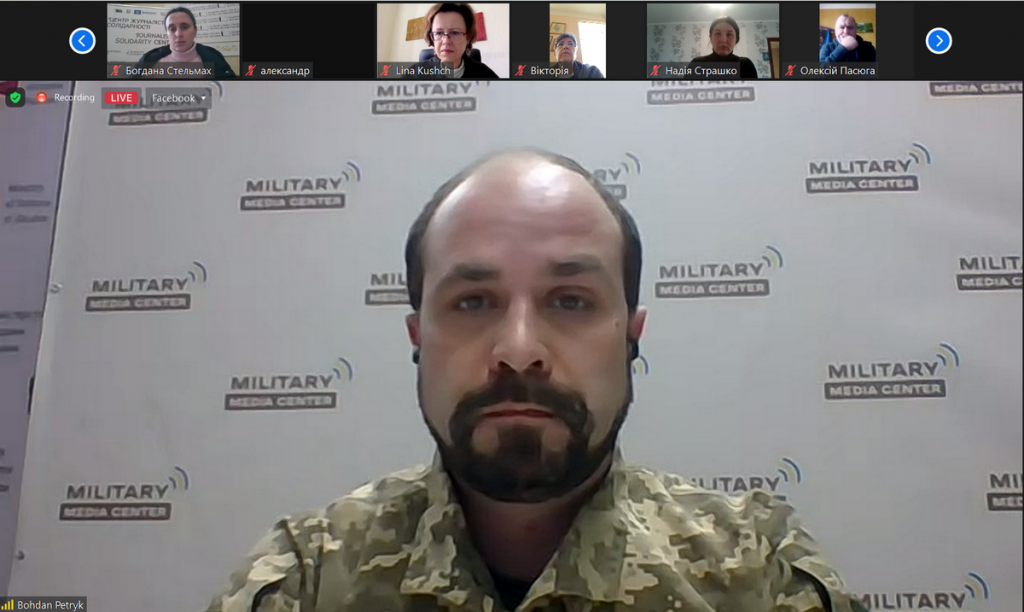
“The main advice when going to dangerous places is to listen to the instructions of the press officers,” Bohdan Petryk said.
Although this opinion would seem to be obvious, reality shows that journalists often, finding themselves in hot spot conditions, try to do things their own way, sometimes they insist on carrying out exactly the filming program that they have planned.
“An incident happened to me: journalists want to go to a specific section of the front. I explained to them that there were not many people there, that they were tired. I offered to go to another place. I was persuading them for a long time. And when they finally agreed, they collected more material in another place than they had originally planned. Therefore, the press officer knows better, it is worth listening to their advice,” emphasized Bohdan Petryk.
He also emphasized that the presence of accreditation or an editorial certificate is not an automatic pass to anywhere on the front. There must be consent from local commanders to receive journalists.
When asked to analyze the importance of the social network in covering the events of the Russian-Ukrainian war, press officer said that he sees the greatest danger in TikTok, where a lot of content that discredits the AFU is spread uncontrollably. In my opinion, the Ukrainian military should actively use such types of social networks as Facebook, Telegram, and Instagram in their work. At the same time, official information should be distributed through Facebook, “promptly” through Telegram (because on Facebook it can be lost among the pile of household information), and through Instagram “portraits and well-made pictures on military subjects. On the other hand, Bohdan Petryk considers Twitter to be a less effective social network under the conditions of Ukraine.
When asked if there is a general ban on showing the faces of military personnel, the press officer replied that there is none, but there are certain specialties of the military (portable anti-tank missile system operators, UAV operators, military intelligence officers and some others) whose faces cannot be shown. So, when journalists are asked to smear the faces of military personnel in photographs, it is better to fulfill this request based on the principle of “Do no harm”.
“I also ask journalists to understand the requirements to agree with press officers on materials prepared for distribution. This demand comes not from mistrust, but from knowledge of certain subtleties of the situation,” Bohdan Petryk said.
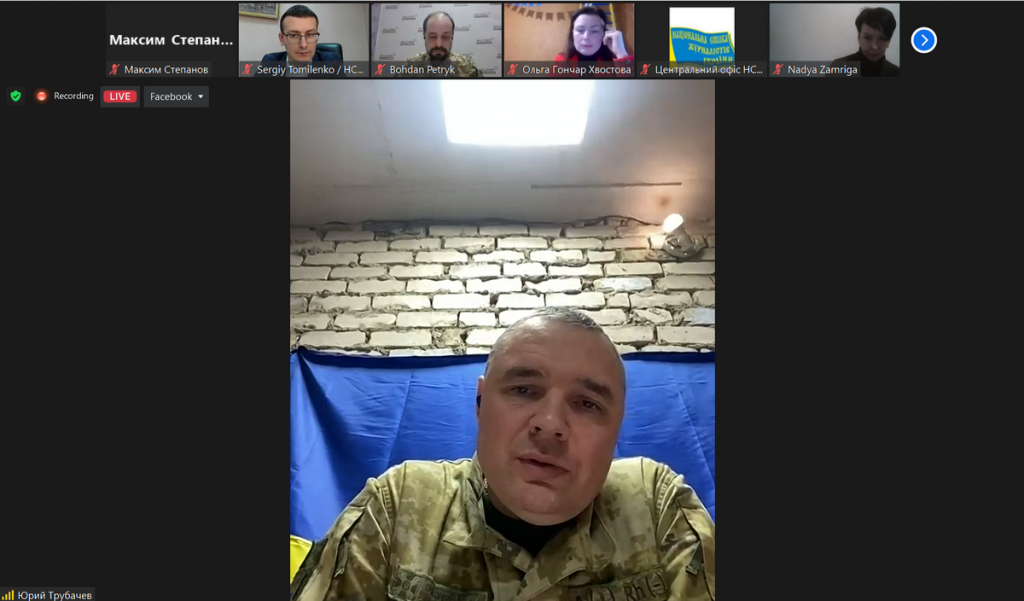
Yurii Trubachov, the spokesperson for the Eastern Regional Department of the State Border Service of Ukraine, has the main advice similar to that that of Bohdan Petryk “listen to advice of press officers.”
He also advises to go through the necessary training in advance for working in a combat zone in order to be psychologically prepared for what you may encounter there. In addition, you cannot go to the front without a bulletproof vest, a helmet and, preferably, a tactical first aid kit. But even if everything is done correctly, the journalist must understand that no one will give him a hundred percent guarantee of safety.
But what you absolutely cannot do is to go to the combat zone on your own, without the presence of a press officer.
As the head of the press service of the 14th separate mechanized brigade named after Prince Roman the Great, Nadiya Zamryha, emphasized, journalists should prepare for trips to the combat zone not only in terms of security (obtaining a bulletproof vest, helmet, tactical first aid kit, training), but also in terms of information.
“It is important for you to make up your mind as for what exactly you want to do in the combat zone. Journalists sometimes don’t understand elementary things, so take an hour or two, learn, for example, what a mechanized brigade is, what it consists of, what weapons it has, in order to ask questions that the military really has an answer to,” advises Nadiya Zamryha.
She also called on journalists to be responsible for their work at the front and not to take any photos secretly from the press officer: publishing such photos could cost someone their life.
“We are doing a common thing, so there is no need to be cunning,” says the press officer. “We are interested in providing you with as much information as possible: the army is open to society, and the guys are happy to see themselves in photos in the media. Therefore, cooperation should be mutually beneficial. Every journalist wants a “highlight” to his material, but it is important not to harm or lose someone’s life in the search for it…”
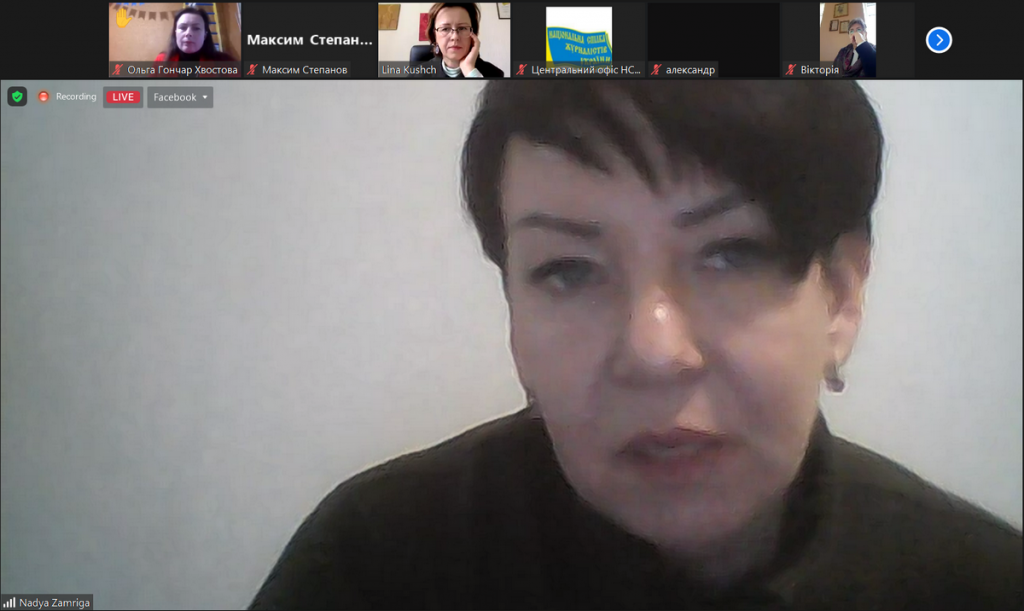
Nadiya Zamryha added that to a civilian it may seem as if all the buildings, trees, power lines that can be in the photo are the same, and no one identifies this place. But in reality it is not so.
“Press services often post photos on social networks, but in fact those are photos from the past. No press service will post a fresh photo when it is still relevant,” assured Nadiya Zamryha.
Press officer of the 112th Territorial Defense Brigade of the AFU Andrii Kovaliov called on journalists to always remember the danger of being in a combat zone. According to him, last year, in the first days of the defense of Kyiv, many journalists, especially foreign ones, made a fatal mistake: they believed that they could speak in the war in the role of outside observers who are outside the war, as if in a parallel world.”
“I told them that, in fact, for the Russian occupiers, there is no big difference whether you are American, French, or Ukrainian,” the press officer recalls. “They kill everyone, and especially then they targeted cars with crosses, medical, evacuation cars and cars with the inscription “Press”. The Russian occupiers, realizing that they were committing crimes, and that these crimes could be recorded, hunted exactly journalists.
Some of the foreign journalists did not listen to this warning and, unfortunately, was killed.
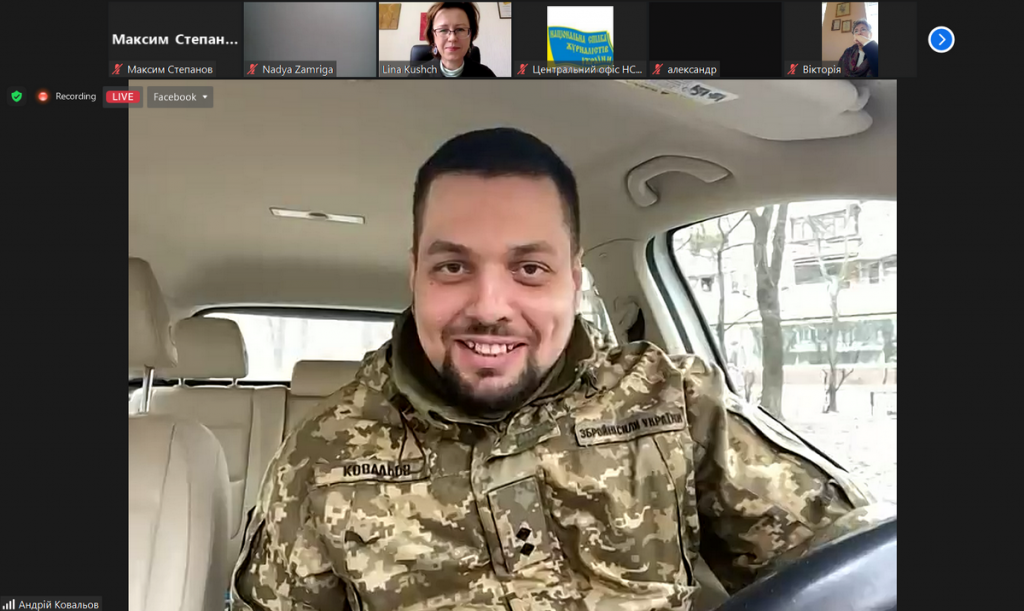
Andrii Kovaliov also spoke about interesting counter-propaganda measures organized by military press services. In particular, in the first days of the large-scale aggression, when “information” appeared in the Russian media that Kyiv had already been captured, the press service of territorial defense decided to organize and film a real wedding at one of the capital’s checkpoints.
“Now I wouldn’t dare to do that, because that place could well have been shelled. But then they looked at it differently,” says Andrii Kovaliov. “The wife of one of my acquaintances said that they had been living together for many years, but they had never been married. And we made this wedding, which was supposed to show: what can Russian soldiers be like in Kyiv, when Ukrainian soldiers are getting married on its outskirts? There were many journalists at the wedding, we have thought out measures for their safety.
And later, when myths spread about the fact that the soldiers of the territorial defense unit are not being trained in any way and that the Ukrainian army allegedly suffers from a lack of reserves, an information campaign was held Training of the Territorial Defense Soldiers in one of the Kyiv Parks. The press service showed the journalists this exercise, after which they were invited to one of Kyiv’s defense points so that the media could see for themselves: the capital is in safe hands and under reliable protection.
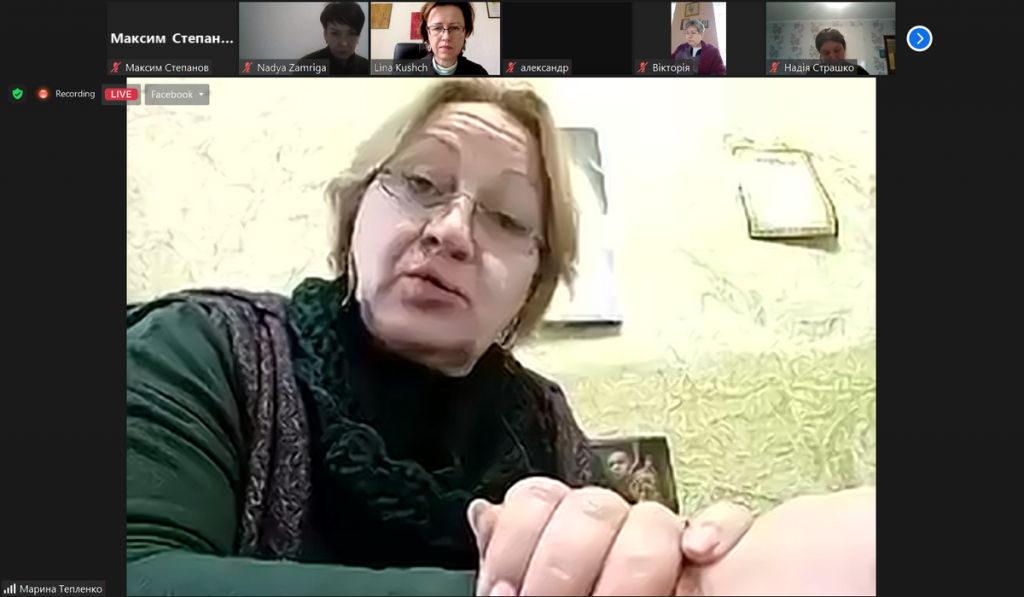
A member of the NUJU audit commission, Maryna Teplenko, who works in the press center of the AFU Air Force, said that the press service of the AFU receives an extremely large number of requests, so it is not possible to answer all of them promptly, and some questions have to be refused. She asked to treat it with understanding.
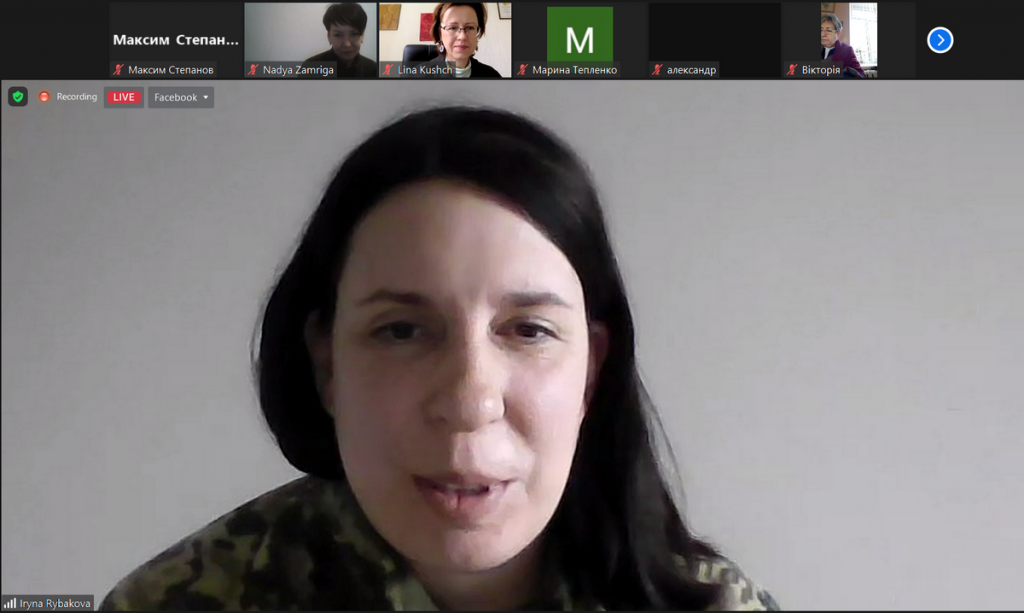
Iryna Rybakova, the press officer of the 93rd Separate Mechanized Brigade of the AFU, specified that her press office receives an average of 10 requests per day from journalists, and there is no way to deal with all of them. Therefore, it is necessary to receive journalists in order of priority, “dosing” Ukrainian and foreign media persons.
And according to Bohdan Petryk, since the beginning of the war, over 14,000 accreditations of the AFU have been issued, i.e., more than a thousand per month. This is a huge amount of work.
Iryna Rybakova also explained the principle by which journalists’ trips to front-line settlements, in particular, to Bakhmut, are organized. According to her, first of all, a journalist must have the consent of the commander of the battalion to which he is going to accept the journalist. If there is such an agreement, the military is ready to deliver the media persons with their transport.
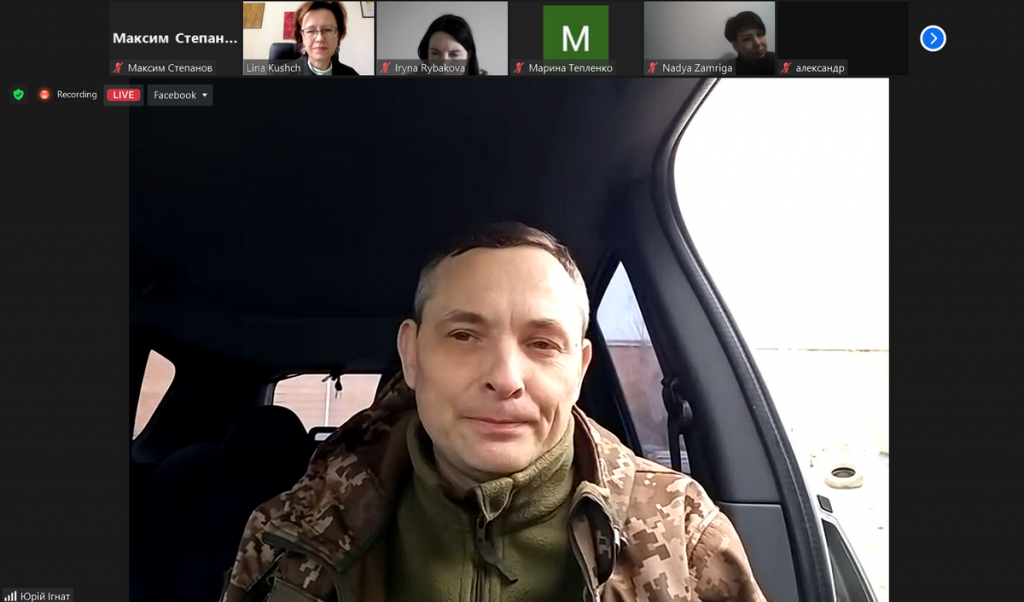
Yurii Ihnat, the spokesman of the AFU Air Force, emphasized that he works a lot with foreign journalists, because the presence of Ukrainian topics in Western media depends on them.
“We have created a special group to which we involve pilots and anti-aircraft fighters. They talk to Western journalists, look them in the eye,” says the press officer. “It is important that the American and European peoples, the peoples of Asia, Africa, in particular, the Arab world, Turkiye know how Ukraine lives and fights, and support our state.”
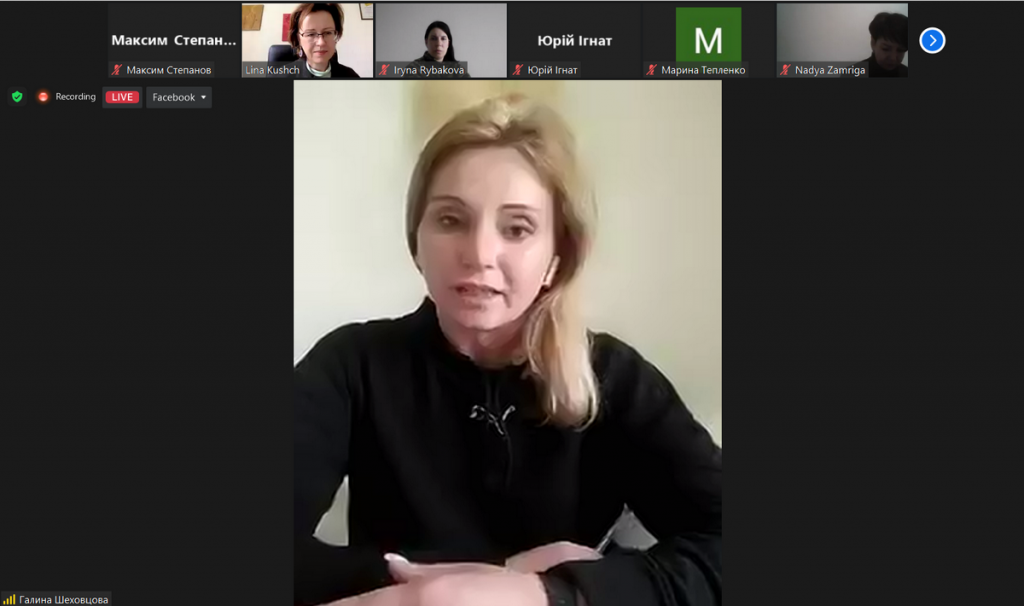
Representatives of the press services of the State Border Service, spokesperson of the Chernihiv border detachment Halyna Shekhovtsova, and press service officer Ivan Ivanchuk emphasized that the work of journalists in the zone 20 km from the Russian border requires separate accreditation from the border guards (accreditation from the Armed Forces of Ukraine is not enough). This is related not only to issues of secrecy, but also to the fact that many areas in these regions are mined, others “are under fire from the Russian side of the border, making these zones dangerous for civilian journalists.
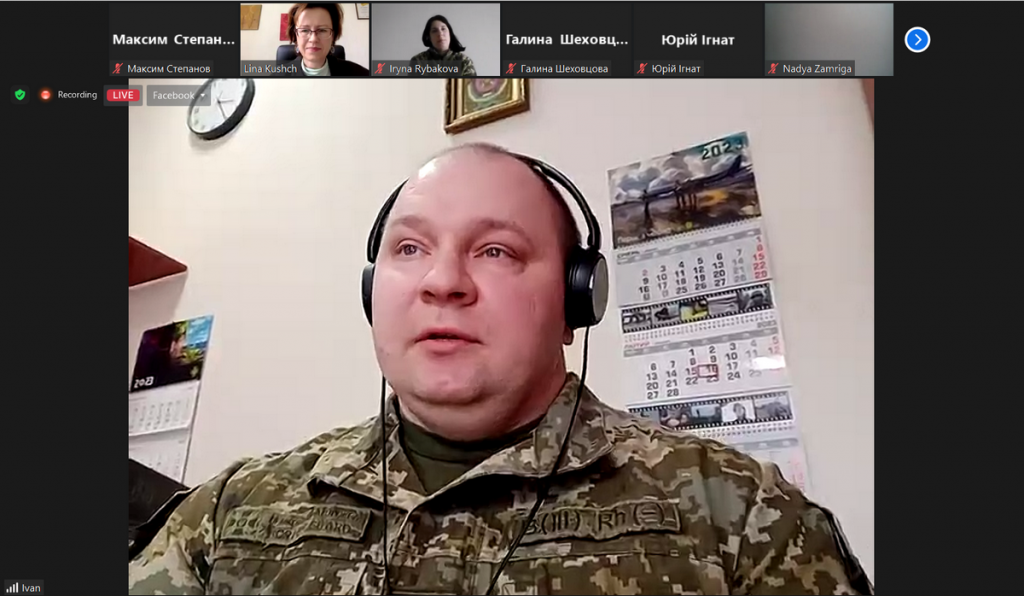
Ivan Ivanchuk called for a responsible approach to accreditation, in particular, to check whether the letter has arrived (because letters from some postal services can be automatically blocked), whether the journalist’s contacts are indicated. There were also cases when foreign journalists, after filling out the accreditation form and not waiting for an answer, tried to go to the place. As a result, they failed to conduct the filming. All issues related to accreditation are covered in the relevant section on the website of the State Border Service. The processing of the request usually takes several days, but it may take longer. Rejection may also occur. The press officer asked to treat this with understanding.
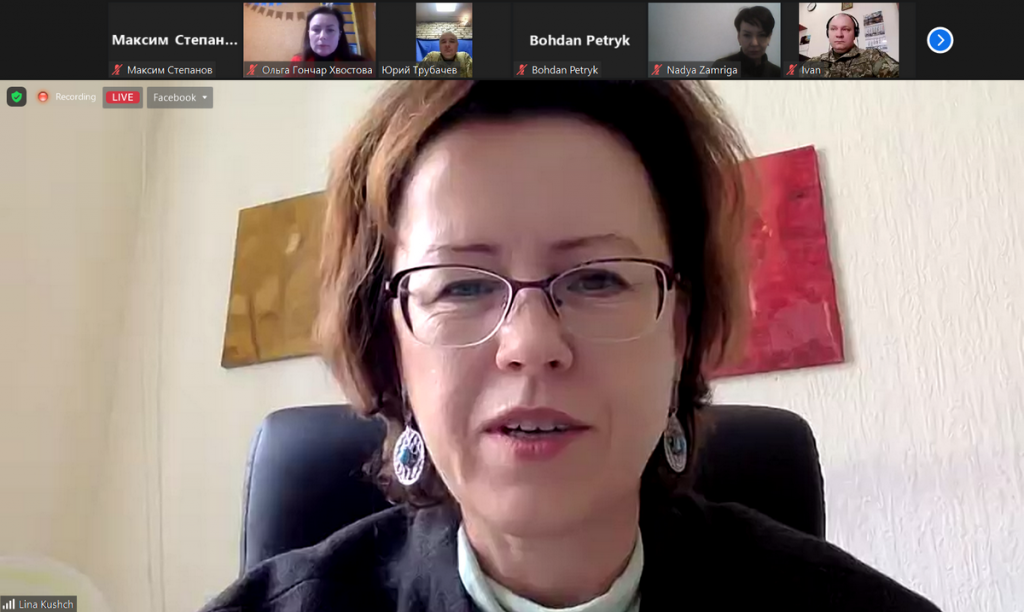
At the end of the meeting, First Secretary of the NUJU, Lina Kushch, who heads the network of the Journalists’ Solidarity Centers, emphasized that the discussed topic is very relevant, and urged to contact the NUJU with any questions that may arise.
“We really appreciate what military journalists do not only to win, but also to help civilian media better inform the whole world and every community about what is happening here in Ukraine,” said Lina Kushch.
As earlier reported, the Journalists’ Solidarity Centers are an initiative of the NUJU implemented with the support of the International and European Federations of Journalists, as well as UNESCO. The initiative is designed to help media representatives working in Ukraine during the war. The Centers operate in Kyiv, Lviv, Ivano-Frankivsk, Chernivtsi, Zaporizhzhia, Dnipro and provide journalists with organizational, technical, legal, psychological, and other types of assistance.
UNESCO is the United Nations Educational, Scientific and Cultural Organization. It contributes to peace and security by promoting international cooperation in education, sciences, culture, communication and information. UNESCO promotes knowledge sharing and the free flow of ideas to accelerate mutual understanding. It is the coordinator of the UN Action Plan on the Safety of Journalists and the Issue of Impunity, which aims to create a free and safe environment for journalists and media workers, thus strengthening peace, democracy, and sustainable development worldwide. UNESCO is working closely with its partner organizations in Ukraine to provide support to journalists on the ground.
The designations employed and the presentation of material throughout this digest do not imply the expression of any opinion whatsoever on the part of UNESCO concerning the legal status of any country, territory, city or area or its authorities, or concerning the delimitation of its frontiers or boundaries. The authors are responsible for the choice and the presentation of the facts contained in this digest and for the opinions expressed therein, which are not necessarily those of UNESCO and do not commit the Organization.
NUJU information service





